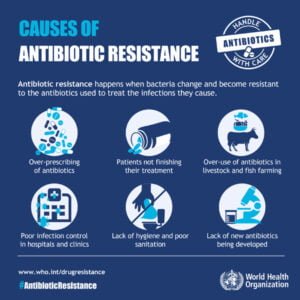The looming threat of antimicrobial resistance (AMR) is rapidly transforming from a distant concern to a dire crisis for Nigeria. The deadly emergence of superbugs microorganisms resistant to medicines has become a far greater menace than the country’s previous health challenges, including malaria, HIV, and tuberculosis. Alarmingly, AMR has now claimed the title of the deadliest health risk across Africa. The World Health Organisation (WHO) warns that this silent pandemic is quietly taking lives and eroding healthcare systems, pushing many nations, including Nigeria, to the brink. Sultan Rabiu reports.

AMR occurs when bacteria, viruses, fungi, or parasites evolve, rendering treatments such as antibiotics, antivirals, antifungals, and antiparasitic ineffective. This growing resistance makes infections harder to treat, leading to higher mortality rates, the spread of diseases, and longer hospital stays, all of which place an immense strain on Nigeria’s already overburdened healthcare system.
For Nigeria, where medical access is inconsistent and infection rates are high, the stakes could not be higher.
Africa Experiencing Highest Mortality
According to the latest data from the Africa Centres for Disease Control and Prevention, Africa is experiencing the highest mortality rates linked to AMR globally—27.3 deaths per 100,000 people. This is higher than the combined death toll from malaria, HIV, and tuberculosis.
Pharmacist Adeyelu Taiwo, a leading voice in Nigeria’s fight against AMR, view underscores the problem’s urgency: “Overprescription of antibiotics by healthcare providers, often without an accurate diagnosis, is a major contributor to antibiotic resistance,” he states in an exclusive interview with Africa Health Report (AHR).
Dr. Walter Kazadi Mulombo

His sentiments are echoed by WHO Country Representative Dr. Walter Kazadi Mulombo, who, in a recent briefing on Nigeria’s AMR action plan, warned, “AMR is a direct threat to Nigeria’s future. If left unchecked, it could claim millions of lives and cripple the economy.”
The Roots of Resistance: Misuse and Lack of Control
The growing resistance is not simply a consequence of natural evolution but largely due to human behaviour and systemic failures. “Non-adherence to prescribed antibiotic regimens, such as failing to complete the full course or misusing medication, allows bacteria to adapt and survive,” Taiwo explains.
The result is that bacteria mutate, developing the ability to withstand treatments that would once have eradicated them.
Taiwo elaborates on the difference between antibiotic resistance and tolerance, noting, “In resistance, microbes develop an inheritable capability to survive even high levels of antibiotics. Tolerance, on the other hand, is when bacteria exist in a dormant state, neither growing nor dying, but can become active again once the stressor (the antibiotic) is gone.”
Both resistance and tolerance have critical implications, especially as they compound the growing threat to public health.
Shortage of New Antibiotics
The problem is further exacerbated by the shortage of new antibiotics. As new resistant strains emerge faster than novel drugs can be developed, the world is running out of options. “The slow pace of developing new antibiotics is not keeping up with the rapid rise of resistant strains,” says Taiwo, highlighting a global concern that is especially pressing in resource-limited settings like Nigeria.

“Poor hygiene, inadequate sanitation, and insufficient infection control measures contribute to the spread of resistant bacteria. Taiwo stresses, “In countries like Nigeria, where access to clean water and sanitation facilities is limited, the conditions are ripe for infections to spread uncontrollably.”
The Nigerian Healthcare Burden: Increased Costs and Greater Vulnerability
The consequences of AMR in Nigeria are staggering. The World Bank warns that by 2050, AMR could lead to $1 trillion in additional healthcare costs globally.
For a developing nation like Nigeria, the financial burden is unsustainable. “Increased healthcare costs, prolonged hospital stays, and more expensive treatments for resistant infections are placing significant pressure on Nigeria’s fragile healthcare system,” explains Taiwo.
Mulombo adds, “The economic implications of AMR are immense. In the coming decades, it could cause trillions of dollars in lost economic productivity, far outstripping the economic impact of any other health crisis.”
The demographic most at risk from this threat is Nigeria’s vulnerable population—particularly children, the elderly, and those with chronic illnesses. With these groups already dealing with high rates of infectious diseases, the increasing difficulty in treating infections due to AMR will only exacerbate existing health inequalities.
A Call to Action: What Can Be Done?
Addressing AMR requires a multifaceted approach, and Nigeria must act swiftly. Pharmacist Taiwo said a few critical strategies: “Public awareness campaigns are crucial. Individuals must complete prescribed antibiotic courses and only use antibiotics when necessary and when prescribed by a healthcare professional.”
On a systemic level, Taiwo calls for stronger regulation on the sale and use of antibiotics, which in Nigeria are sometimes sold without a prescription or over the counter, contributing to misuse.
He also urges the government to invest in healthcare infrastructure to ensure proper sanitation and infection control in hospitals and clinics.
Mulombo also advocates for a collective response to the AMR crisis. “There must be enhanced international cooperation, increased funding for research and development, and greater political commitment to tackling AMR,” he asserts.
He calls on governments, donors, pharmaceutical companies, and researchers to unite in the fight against AMR, emphasising that this is not only a public health issue but also an economic imperative.
Taiwo adds that Nigeria’s healthcare sector needs significant strengthening to keep pace with the evolving threat of AMR. “We need to invest in training healthcare workers, improve diagnostic tools, and establish stronger infection control protocols in healthcare settings,” he urges.
A Bleak Future Without Immediate Action
If AMR is not contained, Nigeria faces a future where simple infections could lead to death, where surgeries are increasingly risky, and where the economic burden of health care could cripple the nation’s development. While the fight against antimicrobial resistance in Nigeria may seem daunting, it is not insurmountable. By strengthening regulations, promoting public health campaigns, and investing in healthcare infrastructure, the country can begin to mitigate the effects of this rising threat.
As Mulombo succinctly puts it: “AMR is not just a health problem; it’s a development challenge. We must address it now to ensure a healthier and more prosperous future for Nigeria and its people.”
In the battle against antimicrobial resistance, Nigeria is at a crossroads. The choices made today will determine whether the country faces a future ravaged by superbugs or one where public health is protected and preserved for generations to come.



